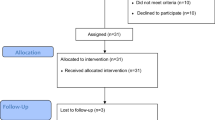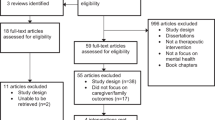Abstract
Forty-five adolescent boys from abusive and depriving homes were not doing well in positive peer culture residential care. Despite their backgrounds, given a modified form of the Relational Ethics Scale, they indicated that their relational life with their families of origin was trustworthy, fair, and worthy of continued devotion. In contrast, on the Firo-B these same boys demonstrated distrust of others outside of their families and an unwillingness to get involved. These results support the inference from contextual family theory that peer group interventions cannot bypass identification and resolution of the injustices that took place in the family of origin.
Similar content being viewed by others
References
Boszormenyi-Nagy, I., & Spark, G. M. (1984).Invisible loyalties: Reciprocity in intergenerational family therapy. New York: Brunner/Mazel.
Boszormenyi-Nagy, I., & Krasner, B. R. (1986).Between give and take: A clinical guide to contextual therapy. New York: Brunner/Mazel.
Goldenthal, P. (1993).Contextual family therapy: Assessment and intervention procedures. Sarasota, FL: Professional Resource Press.
Grunebaum, J. (1990). From discourse to dialogue: the power of fairness in therapy with couples. In R. Chasin, H. Grunebaum, & M. Herzig, (Eds.),One couple, four realities: Multiple perspectives on couple therapy (pp. 191–228). New York: Guilford.
Grunebaum, J. (1988).Contextual therapy, child abuse and feminism. Paper presented at the Annual Meeting, American Association for Marital and Family Therapy. New Orleans.
Hargrave, T. D., & Bomba, A. K. (1993). Further validation of the relational ethics scale.Journal of Marital and Family Therapy, 19, 292–299.
Hargrave, T. D., Jennings, G., & Anderson, W. (1991). The development of a relational ethics scale.Journal of Marital and Family Therapy, 17, 145–158.
McCorkle, L., Elias, A., & Bixby, F. L. (1958).The highlands story. New York: Holt.
Ryan, L. R. (1989).Clinical interpretation of the FIRO-B (3rd ed.). Palo Alto: Consulting Psychologists Press.
Scharff, D., & Scharff, J. S. (1987).Object relations family therapy. New York: Jason Aronson.
Solomon, M. F. (1989).Narcissism and intimacy. New York: Norton.
Van Heusden, A. & Van Den Eerenbeemt, E. (1987).Balance in motion: Ivan Boszormenyi-Nagy and his vision of individual and family therapy. New York: Brunner/Mazel.
Vorrath, H., & Brendtro, C. (1985).Positive peer culture (2nd ed.). Hawthorne, New York: Aldine.
Author information
Authors and Affiliations
Additional information
This project was fully supported by Teen Ranch, Inc., Marlette, MI 48453.
Rights and permissions
About this article
Cite this article
Lee, R.E. Availability to peer group treatment in residential care as a function of relational ethics. Contemp Fam Ther 17, 343–348 (1995). https://doi.org/10.1007/BF02252671
Issue Date:
DOI: https://doi.org/10.1007/BF02252671




